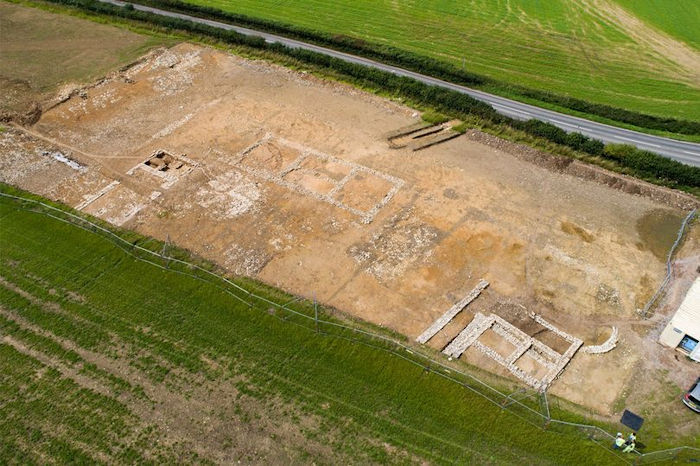Conny Waters – MessageToEagle.com – Archaeologists have announced a surprising discovery of an ancient Roman mercenary buried with his sword and his military regalia. The skeleton was unearthed near Five Mile Lane, in the Welsh countryside. Based on preliminary reports, the skeleton is 1,700-year-old. While excavating at the site, archaeologists also found Iron Age farming tools, ancient burial sites, and roundhouses’ remnants.
Archaeological remains found near Five Mile Lane. Pictured is a Roman villa unearthed by archaeologists. Credit: Wales News Service
As many as 456 skeletons have been recovered from the site on Five Mile Lane, and five of them are likely to date to the Roman period. At the site, scientists also made a gruesome discovery. They found the remains of a one man who had been decapitated. His head had been placed at his feet.
“Rubicon Heritage Services Ltd began excavation of the site in 2017 ahead of the Council’s A4226 road improvement project.The study site was initially subject to a desk-based assessment and a geophysical survey which identified the key areas that needed further exploration.
Three areas were identified as highly significant with extensive remains and so were fully excavated.
The excavation uncovered various fascinating artifacts and structures, providing evidence of the people who inhabited the area from early prehistory through to the Roman period,” Vale of Glamorgan Council informs.
“From a ceremonial and funerary landscape in the Neolithic and Bronze Age periods, through to farming in the Iron Age and being part of a wealthy Roman farmstead, to a Medieval burial ground which reused the earlier burial mound, and finally to the post-medieval agricultural landscape we see today, the archaeologists were able to trace the development of this swathe of land, uncovering many surprises along the way,” the company said.
“It was a privilege for our team to have delivered a project which added so many new discoveries about the archaeology and history of the Vale of Glamorgan.
‘We’re very pleased to be able now to share the results in such an accessible format with the communities of the area,” Mark Collard, of Rubicon Heritage Services said.
The 1,700-year-old skeleton of a Roman mercenary has been unearthed next to a newly-built road in the Welsh countryside. Credit: Wales News Service
“In the 1960s, a prehistoric settlement that developed into a Roman villa was excavated following the discovery of cropmarks visible from the air.
Whitton Lodge is thought to have been occupied from about 50 BC to the 4th century AD, at the close of the Roman period.
Roman pottery found at the site. Credit: Wales News Service
Throughout its lifetime the settlement was characterized by changing layouts made up of from three to five buildings, archaeologists have said, but during the Roman period it formed the focus of a farmstead,” the Daily Mail reports.
See also: More Archaeology News
After the archaeologists finish analyzing the remains, their detailed academic findings should be published by the end of the year. The finds will later be taken to the National Museum of Wales.
Written by Conny Waters – MessageToEagle.com – AncientPages.com Staff Writer








